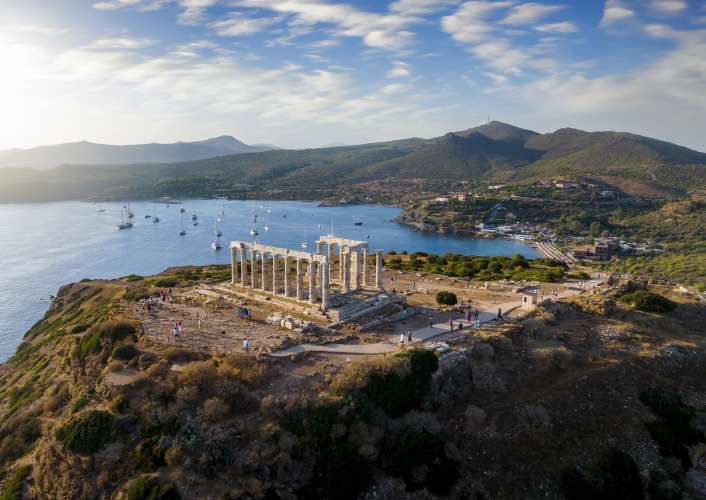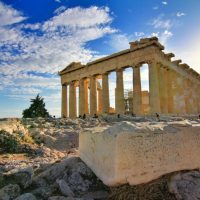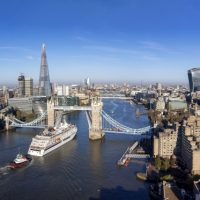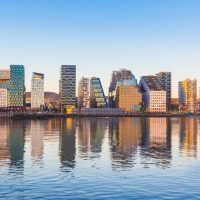From the Parthenon to the Greek Islands, imagine a vacation where the scenery consists of gorgeous beaches that line turquoise blue water.
Everything within sight includes breathtaking landscapes that look like they belong framed on a wall or a puzzle.
Greece offers all this plus delicious, mouth-watering food and drink and friendly, hospitable locals in a place rich in history.
As a whole, Greece is considered safe for tourists.
However, be on your guard in densely populated areas, especially Athens.
In a country with a population of more than 3 million, overall property and violent property crimes rank at .75 per 100,000.
However, there are some things to look out for and areas to avoid to enjoy your trip thoroughly.
Contents
10 Most Dangerous Cities in Greece
While most of the country of Greece is considered safe, Athens made the list of most dangerous cities in Europe, ranking as #16 with a crime rate of 55.57.
Dangers and crime are always opportunities in large cities, no matter where you are.
Any danger lurking is most likely found in the more densely populated areas of any country within big cities, especially Athens.
Since the rest of the land of Greece is considered safe, some sites mentioned as dangerous cities are squares or neighborhoods within that city.
Here are the ten most dangerous cities, squares, or neighborhoods to avoid or take extra precautions when visiting Greece.
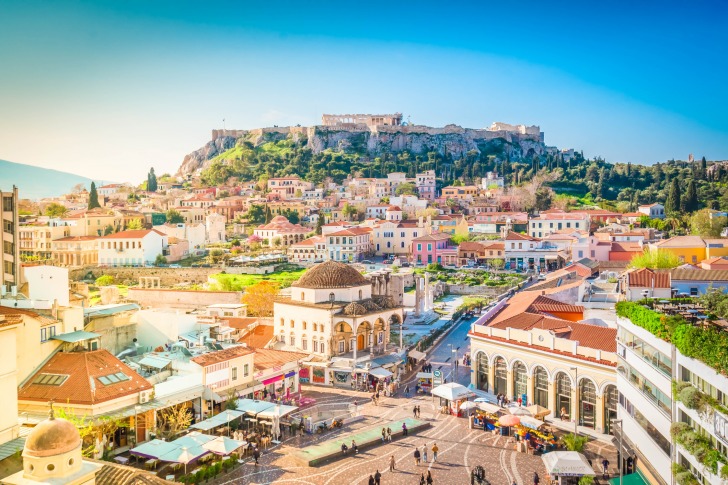
Athens
Since Athens is the capital city of Greece and has a population of more than 3 million people, it is the country’s most dangerous part.
As expected in most capital cities worldwide, Athens has a history of vigorous civil protests.
Athens also has universities where anarchist groups tend to gather.
The U.S. State Department warns against visiting Polytechnic or Aristotle Universities.
Although severe crimes like murder or rape tend to stay reasonably low, watch out for pickpockets, especially in heavily populated squares like Vathi, Kolokotroni, Embassy Row, on the Metro, or shopping districts.
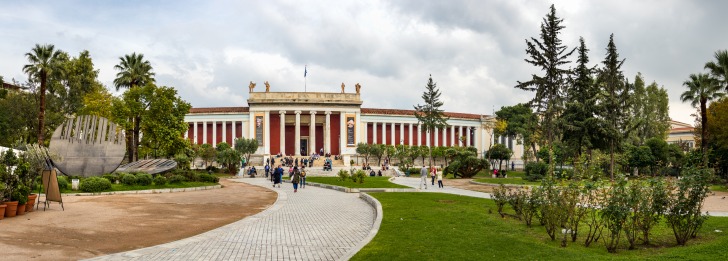
Exarcheia
A community in central Athens and near a university, Exarcheia has a history of radical political and intellectual activism.
Locals often refer to the area as the anarchist quarter of the city.
The site has a reputation for its activism which has the potential to get out of hand quickly.
To stay safe, avoid this District known for anarchy, where tensions and police interventions occur frequently.
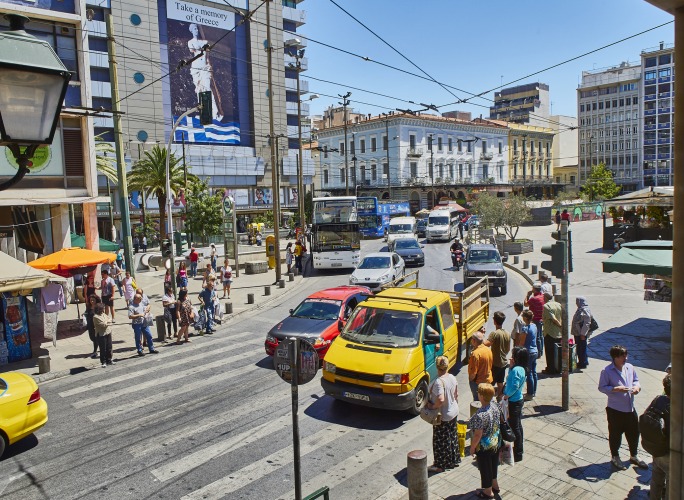
Omonia
Enjoy Omonia as a lively area during the day.
It offers a market, traditional taverns, and several shops
. However, be on guard and avoid the area at night.
A busy place in Athens that tends to attract homeless people.
These locals see tourists as an opportunity to ask for money or food. Be aware of your surroundings, and use caution.
Sometimes, they get violent or try to rob visitors.
Local police know the area for drug addicts, prostitutes, and petty crime.
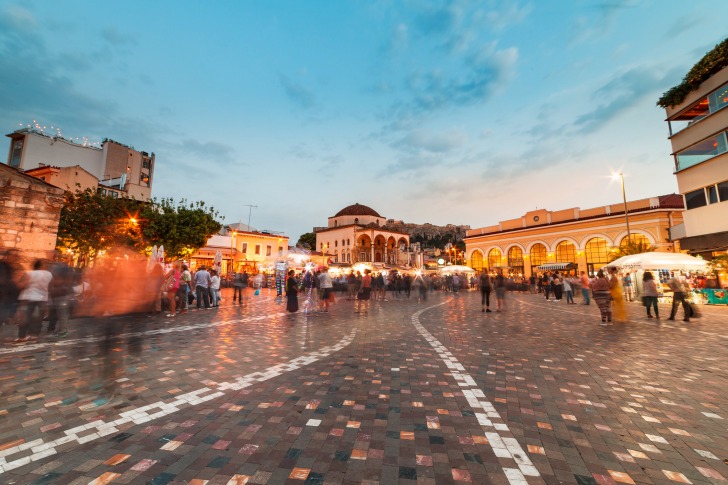
Monastiraki Square
This square is another area in Athens located outside Plaka and near popular tourist destinations such as the Acropolis.
The Monastiraki Square region is a shopping District near the parliament known for petty thefts.
The area offers many hotels, shops, and restaurants, so it tends to get crowded.
Always be vigilant in crowds since many people gather around, making it easier to get pickpocketed without noticing until it’s too late.
Also, since it is a shopping District, watch out for upcharges or scams from street vendors.
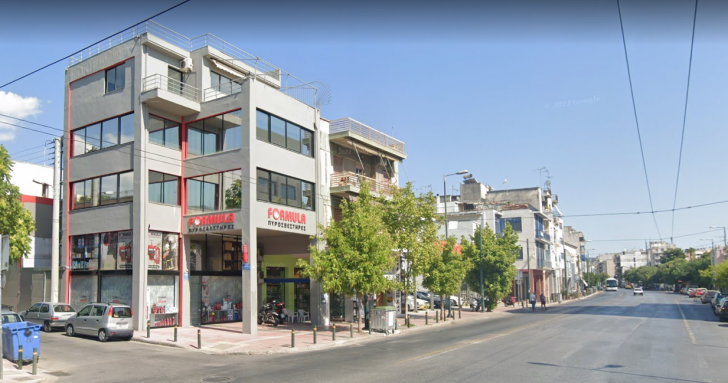
Colonus, or Kolonus
Colonus, or Kolonus, is a District south of Sepolia where the metro station runs.
Avoid both Sepolia and Kolonus if you want to stay safe.
This area northwest of the city of Athens is stricken with poverty.
Drugs also wreak havoc in the area.
Wherever drugs are prevalent, mixed with poverty, the opportunity for pickpockets and more severe crimes runs high.
Don’t become a victim by walking through or spending much time in this area.
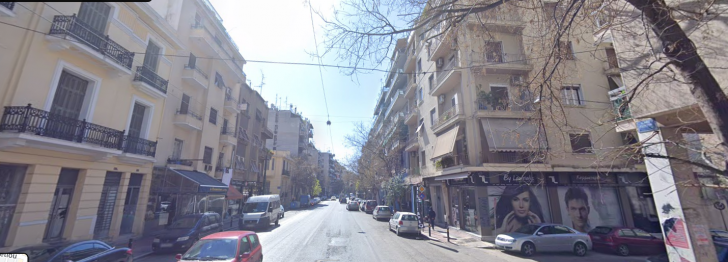
Agio Panteliemonas
If there is any area to avoid in Athens, steer clear of the central Athens District Agio Panteliemonas.
This place is a territory out of control.
Tensions between police officers, political groups, and migrants looking to settle a scoring run rampant here.
Reports of organized crime groups and terrorism are not uncommon in this District.
Concentrated efforts are underway to turn the area safe again, but until that happens, avoid this area northwest of the center of Athens.
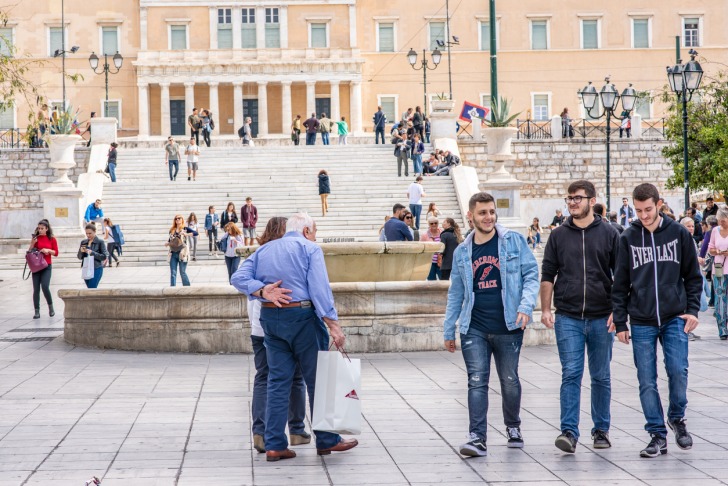
Syntagma
Located not far from the Acropolis, avoid this area south of the center of Athens.
Syntagma and Glyfada are notoriously dangerous for organized crime.
Visitors encounter crime gangs that run rampant.
One Romanian unit that tourists warned against included a group or a couple with a child.
The team often uses distraction while the child runs up to steal your wallet.
Another gang used attractive females to do the dirty work of reaching into your bags to take whatever they could grab.
Meanwhile, local police seem to turn a blind eye to notice or offer help.
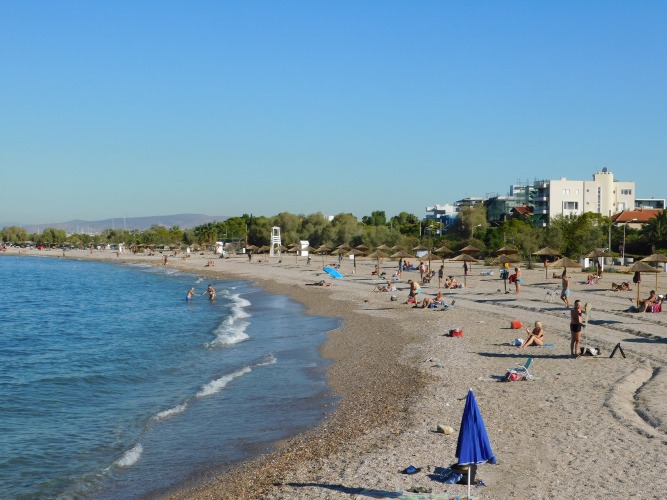
Glyfada
Parts of this location include beautiful beachfront hotels.
However, don’t get so swept up in the beauty of the waters that you become a victim of a violent crime.
Most of the crime in this area occurs away from the beaches closer to town.
Avoid the bars and clubs in southwestern Athens, especially those in Glyfada Square.
Like Syntagma, Glyfada clubs have a reputation tied to organized crime syndicates.
Notably, avoid partying in Glyfada late at night.
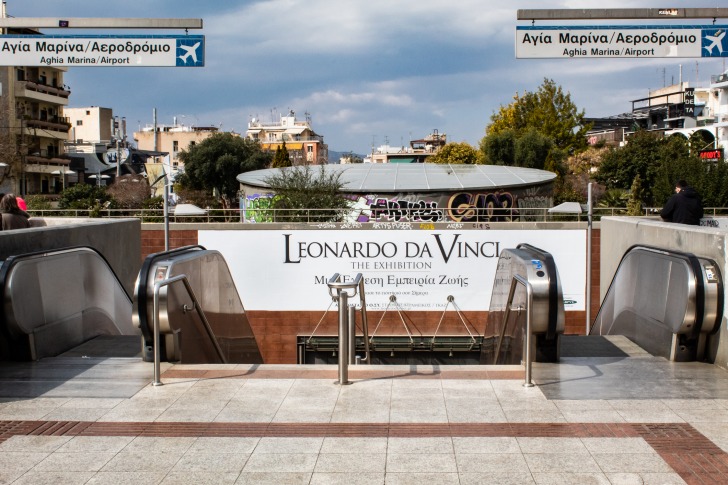
Gazi Area
Some argue that Gazi used to be a downtrodden area to avoid, but efforts to clean it up have made it safe.
Still, be on your guard in Gazi. Many come to Gazi to attend a concert at the Music Hall.
However, Gazi is an area in Athens known for its wild nightlife, and experiences prostitution with brothels and run-down small businesses.
As an industrial area, the region also has theft and drug crimes.
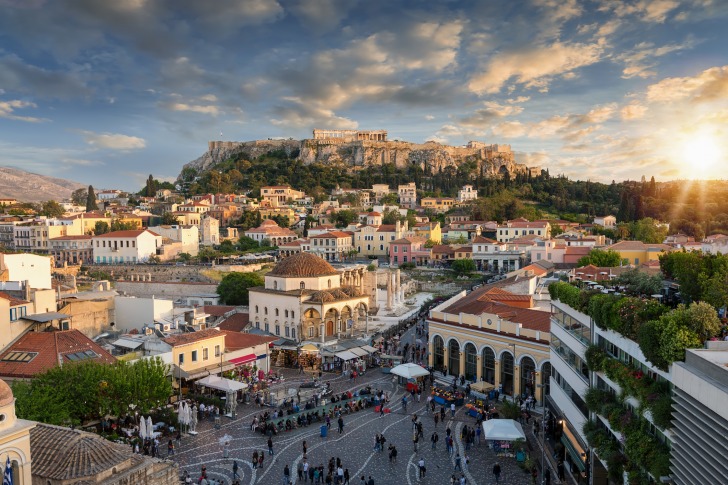
Plaka
Located close to the Acropolis, many visitors want to stay nearby.
However, be aware of the dangers in Plaka.
Tourists report many crimes in this neighborhood, especially theft, from stolen bags to rental vehicles.
When tourists rent a car, several stickers inadvertently alert thieves that the car is being used by tourists, making them an easy target.
Additionally, as a highly commercial tourist area, Plaka has chaotic traffic.
5 Safety Tips For Traveling to Greece
Consider these five safety tips when traveling to Greece:
- Avoid petty theft in Greece by planning your itinerary ahead of time. Also, stay aware of holidays, like Orthodox Easter, where locals often make their fireworks, or dates where protests are most likely to break out, like November 17, the anniversary of the 1973 uprisings.
- Refrain from carrying all of your essential personal effects on you. Take only the cash you need for the day or one credit card with you leaving your passport locked in the hotel safe. Wear unique wallets that strap on the inside of your leg or underwear. If you carry a purse, get one with a metal strap so it is impossible to cut.
- Disperse items you cannot easily replace, such as the hotel key or your phone, across your body. Since they are not all in one easy-to-pick pocket, theft is more challenging. Spreading out your belongings will limit the damaging impact if you encounter a pickpocket.
- Travel in a group. Groups, especially those where one person keeps vigilant watch, deter would-be criminals.
- Use caution when visiting heavily populated historic tourist sites or farmer’s markets. Watch out for distractions that allow grabbing your attention while another pickpocket robs you. Be on your guard in crowds.
Additionally, learn enough of the language to communicate words like “help,” hello or thank you in Greek.
Make color copies of your passport, license, or visa.
Look on a map to get familiar with the areas you plan to visit before you venture out.
Violent crimes in Greece happen between organized crime rings and don’t typically pose a massive threat to tourists.
Still, never take chances no matter where.
Exercise caution so you don’t become a victim.
Greece Safety Overview
READ THE FULL REPORT: Greece Safety Review
Safety Index:
- OVERALL RISK: LOW
- TRANSPORT & TAXIS RISK: LOW
- PICKPOCKETS RISK: MEDIUM
- NATURAL DISASTERS RISK: MEDIUM
- MUGGING RISK: LOW
- TERRORISM RISK: LOW
- SCAMS RISK: MEDIUM
- WOMEN TRAVELERS RISK: LOW
Frequently Asked Questions
Is Public Transportation Safe in Greece?
Athens has the best public transportation in the country, but it also creates an opportunity for pickpockets to target tourists.
Tourists also need to look out for common taxi scams.
Arranging transportation ahead of time with local tour guides is your best option to avoid scams.
What Is The Weather Like In Greece?
Most tourists find the weather in Greece to be near-perfect almost year-round.
Summers are warm, while the winters see colder temperatures and snow in the mountains.
Greece tends to experience partly cloudy weather year-round, with temperatures varying from 79 degrees Fahrenheit and 87 degrees Fahrenheit.
Why Are There Pickpockets and Tourist Scams in Greece?
Greece is not considered a violent country.
Most of the dangers tourists encounter in Greece include petty theft, scams, or pickpockets.
While Greece’s landscapes and beaches offer a spectacular spot to visit, many locals struggle under the country’s ailing economy and see tourists as a suitable target for financial gain.
What is the Safest Spot to Visit in Greece?
The safest place to visit in Greece is Thessaloniki.
With more than 100,000 residents, Thessaloniki enjoys the lowest crime rate of any large city in Greece.
The Greek Islands are also very safe.
What Customs or Laws Do I Need to Know About When Traveling Through Greece?
Respect the customs and the culture of the Greek people and their history.
Never touch or deface any works of art or historical artifacts.
Also, never photograph any military outposts, installations, or buildings.
Additionally, refrain from getting involved in any political demonstrations.
